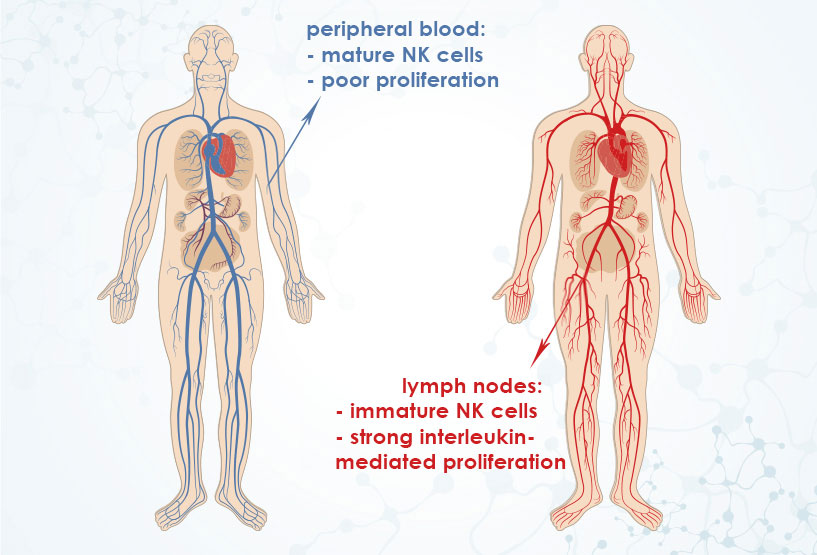

Most of NK cells in the blood are mature cells able to kill their targets but characterized by scarce proliferation. On the contrary, NK cells in lymph nodes are less mature but can proliferate more in the presence of specific molecules (the so-called interleukins).
THE IMMUNE SYSTEM
The immune system defends the organism from external and internal dangers by means of specific structures and mechanisms. Natural Killers cells play an important role during the first stages of the immune response.
These cells exert a cytotoxic action against cells infected by viruses or against dysfunctional somatic cells (cancer).
Their unique action is characterized by their rapidity and their capability to recognize cellular stress.
BLOOD AND UMBILICAL CORD NK CELLS
Both peripheral blood (PB) and umbilical cord blood (UCB) contain NK cells. UCB NK cells are less mature than PB NK cells. However, UCB NK cells are characterized by a very high proliferation capability, are more concentrated (30% vs 10%) and require simpler purification methods.
UCB NK cells proliferation can be stimulated ex vivo (that is, in the laboratory) by incubation with molecules produced by immune cells (cytokines) to obtain a 1800-2400 fold increase in cell number. During this process UCB NK cells cytotoxicity (hence their efficacy) increases too.
NATURAL KILLER CELLS
NK cells have been discovered more than 40 years ago. In the last 10 years they gained interest among oncologists and immunologists.
They can recognize their targets (infected or dysfunctional cells) by means of specific receptors. Upon interaction, they can induce cell lysis by releasing toxic substances. Moreover, they can induce programmed cell death (apoptosis).
By producing interferon-γ NK cells can kill virus-transformed cells, and by inhibiting angiogenesis they can counteract cancer growth.
UMBILICAL CORD BLOOD CRYOPRESERVATION
UCB banking makes available a large quantity of haematopoietic stem cells and a valuable source of NK cells for autologous or haploidentical use. Preclinical studies demonstrated that it is possible to obtain NK cells from small UCB samples too1. Moreover, haploidentical cells infusion is safe2.
NK cells can be safely preserved, and today ex vivo expansion techniques make available very large quantities of highly purified cells which are able to efficiently kill cancer cells1,3.
NK CELLS AND CANCER
Several studies demonstrated NK cell-based therapies feasibility and safety. The use of haploidentical (that is, from a blood relative – parent, son, daughter, sibling or cousin) or autologous (that is, from the same patient that will be treated) NK cells, coupled with new approaches to sensitize against cancer cells, opened new ways in the field of immuno-oncology. These strategies are useful both from a therapeutic point of view and for the development of anticancer immunity to delay disease development.

NK CELLS AND AUTOIMMUNE DISEASES
NK cells are important regulators of the immune response. They play a role also in autoimmune diseases such as multiple sclerosis (MS), rheumatoid arthritis (RA) and systemic lupus erythematosus (SLE).
NK CELLS TO DEFEND THE ORGANISM
If immune function is not optimal, severe pathologies can take over.
Diseases such as cancer and severe infections decrease NK cells capability to defend the organism from external and internal dangers, paving the way to the development of other diseases. Moreover, if NK cells are no more able to play their role, such as in case of depression, disease development can be promoted.
In this frame, immune system can be reinforced with fresh and efficient NK cells previously cryopreserved and expanded, which increase organism defenses against external dangers and avoid disease complication development.
PROCEDURES
Bioscience Institute procedures are based on the use of a particular mixture that protects cells during the cryopreservation in a four-3D compartment bag. In this bag it is possible to preserve both stem cells NK cells for at lest 20 years. The four-compartment design allow multiple usage of cryopreserved NK cells.
However, a stem cell bank is not sufficient to cryopreserve and use NK cells. To do it, it is mandatory to have a cell factory able to growth cells.
Bioscience Institute is a GMP (Good Manufacturing Practices)-certified cell factory able to cryopreserve and growth human cells in the respect of the high quality standards required by international laws.
Bibliography
1. Chabannon C et al. Front Immunol. 2016 Nov 15; 7:504. doi: 10.3389/fimmu.2016.00504
2. Balassa K and Rocha V. Expert Opin Biol Ther. 2018 Feb;18(2):121-134. doi: 10.1080/14712598.2018.1402002
3. Liu E et al. Leukemia. 2018 Feb;32(2):520-531. doi: 10.1038/leu.2017.226


